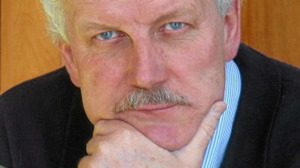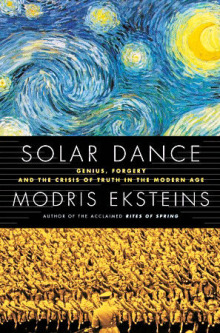BURLINGTON, ON February 16, 2012 I’m not quite sure how he does it but Ian Elliott, proprietor of The Different Drummer Bookstore manages to attract some very impressive authors to his Engaging Ideas events he holds at the Public Library.
He recently had Michelle Landsberg as a guest and while I wasn’t able to make it to that event, I am told it was a great evening. Landsberg is always good copy and good conversation.

An author with an international reputation and the ability to explain issues and ideas better than many - will be in Burlington February 27th.
On February 27, 7 pm author Modris Eksteins will introduce his new book Solar Dance: Genius, Forgery, and the Crisis of Truth in the Modern Age.
While that is certainly a mouthful of a title in the book, Dr. Eksteins examines the career and concerns of Vincent Van Gogh and the explosion of his international reputation through a chain of surprising events in Weimar Germany.
Ekstein’s previous books, Rites of Spring: The Great War and the Birth of the Modern Age, and Walking Since Daybreak: A Story of Eastern Europe, World War II and the Heart of Our Century, have brought him major literary awards along with great international success and acclaim.
Solar Dance shares with these works an extraordinary recreation of the times, illuminated with keen insight and an astonishing range of reference in an artful, engaging and edifying presentation.
To reserve seats in advance, please contact us at (905) 639 0925 or diffdrum@mac.com.
We have pinched shamelessly from a Globe and Mail review of Eksteins work. I not only don’t have the time to review the books (but they are on my list of books to read) but I don’t think I could do as well as Mark Kingwell. If you are interested in reviewing books for Our Burlington – be in touch.
From Globe and Mail, February 10, 2012
No film fan can forget the scene in Woody Allen’s Manhattan (1979) in which two pseudo-intellectual New Yorkers, played by Michael Murphy and Diane Keaton, enumerate the members of their “Academy of the Overrated”: Norman Mailer, Scott Fitzgerald, Lenny Bruce, Gustav Mahler, Heinrich Böll, Ingmar Bergman, Carl Jung, Walt Whitman, Isak Dinesen, possibly Sol LeWitt.
Allen’s character, Isaac, a self-involved but earnest television writer, is particularly dismayed by their inclusion of Vincent van Gogh – pronounced, notoriously, “van Goch”
“Van Goch?” he mouths incredulously to his girlfriend. “She said van Goch?”
Van Gogh has been sneer fodder for snobs longer than most. Critic Carl Steinem, commenting on the craze for his work in the early 1920s, condemned the work as “petit-bourgeois kitsch” with “the likeness of a collectively minded idiot.”
Then and now, denunciations seem only to fuel an enduring, outsized popularity. Three of the highest prices ever paid for art were fetched by van Gogh’s work, even as blockbuster shows continue to create queues down the blocks of every city with an art gallery.
Posters of his paintings regularly outsell every other artist, to the point of being a dorm-room nuisance – for God’s sake, hang something else! – and his visage, name, story and signature now adorn everything from high-end liquor to banks.
This ubiquity has a non-cash price, namely that, precisely because we see the works everywhere, it’s no longer possible for us to see them. The startling vividness of van Gogh’s vision, the madness, the tragic impoverished death at 37 with just one work sold, no longer have the antagonistic power of a century ago.
Philosopher Karl Jaspers: “I could not help feeling that van Gogh was the only truly great and unwillingly ‘insane’ person among so many who pretended to be insane but are really all too normal.” Nowadays, van Gogh is no longer even an authentic madman; he is, instead, a textbook case of cultural over-determination, strangled by his own success.

The book is about the guy who cut off his ear and sold just the one painting before his life ended at 37 - it is much more than that.
Modris Eksteins’s subtle and engaging new book offers an account of how this came to be, and in telling it, Eksteins bestows a great gift: new strangeness. In 56 short sections, each linked to a van Gogh work, he interweaves the large fabric of culture, politics and money with the small, indeed pedestrian tale of a dancer turned art dealer who, in 1927, was arrested for the crime of offering 30 forged van Goghs for sale. The dealer, Otto Wacker – also known by various stage names and pseudonyms – was, in Eksteins’s phrase, a “twentieth-century mutant”: chancer, fabulist, romantic, a homosexual who joined the Nazi party, a dancer who leaped around the truth as well as the stage.
Wacker, in common with many talented men and women of Germany’s Weimar period, found interregnum Berlin an irresistible playground for stimulation and self-creation. “Berlin was crazy, debauched, metropolitan, anonymous, gargantuan, futuristic,” one Viennese writer said, “an infernal cesspool and paradise in one.” The combination of freedom and anonymity – the “metropolitan attitude” that sociologist Georg Simmel had identified as early as 1903 – would have lasting effect not just on these people but on the century’s course. Painters, writers, architects, philosophers and frauds of all types flocked to the wide-open, decadent city that would later host the extended madness, the violent “solar dance,” of Hitler’s Third Reich.
The Weimar Republic, Eksteins writes here, “was installation art on a grand scale, a fantastic panorama of commotion, imagination, and violence, literal and figurative, fuelled by a never-ending sense of emergency. Hitler and National Socialism were as much a product of Weimar as were Walter Gropius’s architecture, Fritz Lang’s films, and Marlene Dietrich’s legs.”
Makes you want to read the book – take advantage of the opportunity to meet the author. I won’t be able to attend – there is a City Council committee meeting that needs attention. If you choose not to join me at Council committee – do get to the library and take in this event.




















